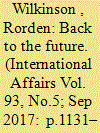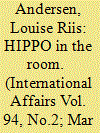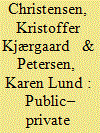| Srl | Item |
| 1 |
ID:
155479


|
|
|
|
|
| Summary/Abstract |
This article reflects on the role crises play in enabling existing systems of global economic governance to evolve and endure while also preserving underlying power dynamics. The article uses as its case-study global trade governance. Its aim is to explore the impact of the negotiating crises that beset the World Trade Organization's (WTO) Doha round of trade negotiations. The article traces how, over the course of the Doha round, periodic crises resulting from divergent pressures for opposing outcomes combined to preclude one set of institutional developments from resulting (those on which the Doha round had been launched and the basis upon which developing countries negotiated) while enabling others (those advanced by the leading industrial states). The result has been to usher in changes that have returned global trade governance to a form of system management more familiar to observers of the multilateral trading system of the 1970s. This ‘retro’ form of trade governance signals a departure from the more inclusive system that had emerged from the Uruguay round of the General Agreement on Tariffs and Trade (GATT) and evolved during the WTO's early years, replacing it with a lither system of mini-lateralism more fit for industrial country purposes.
|
|
|
|
|
|
|
|
|
|
|
|
|
|
|
|
| 2 |
ID:
158713


|
|
|
|
|
| Summary/Abstract |
As the global political landscape is in flux, the roles and functions of United Nations (UN) peacekeeping is also shifting. Increasingly, UN peacekeepers are deployed to places where there is no peace to keep. This challenges and undermines existing foundational assumptions of what UN peacekeeping ‘is’. Focusing on the UN peace bureaucracy, this article contributes to the debate on the future of UN peace operations and the pragmatic turn in peacebuilding. It does so by taking a step back to ask not how to make the UN ‘fit for purpose’ but rather for what purpose the international civil servants working for the UN wish the world body to be fit. Zooming in on the review conducted by the High-level Independent Panel on Peace Operations (HIPPO) in 2014–2015, the article interprets the HIPPO as a deliberate push-back against the Security Council's robust turn to stabilization. To counter this militarized form of pragmatism, the HIPPO produced an alternative—more UN-like—yet still pragmatic vision of the future role of UN peace operations in the twenty-first century. The article suggests that while the Zeitgeist is moving from liberal templates towards more pragmatic forms of intervention, the exact role of the UN in this move remains contested—with UN officials actively contributing to the contestations.
|
|
|
|
|
|
|
|
|
|
|
|
|
|
|
|
| 3 |
ID:
157976


|
|
|
|
|
| Summary/Abstract |
The governance of cyber-security risks is seen as increasingly important to the security of the nation. However, cyber-security risks are characterized by a fundamental uncertainty, which poses a great challenge to their governance and calls for new modes of organizing security politics. Public–private partnerships (PPPs) are often seen as the answer to this challenge by enhancing flexibility and robustness through knowledge-sharing. Engaging with the literature on PPPs and the Danish practice on cyber security, we show how PPPs involve controversies over different threat realities of cyber security. This plays out as controversies over what is considered threatened, the scope of the issue and the kind of expertise to be mobilized. Arguing that PPPs on security are not defined narrowly by short-sighted strategic self-interest but also loyalty and commitment, we suggest that the innovative potential of such PPPs lie not in a possible consensus on a common purpose and threat reality, but in the ability to embrace divergent definitions and approaches to cyber security. Acknowledging the corporate interests and loyalty, we suggest a move towards the notion of partnering through dissent.
|
|
|
|
|
|
|
|
|
|
|
|
|
|
|
|